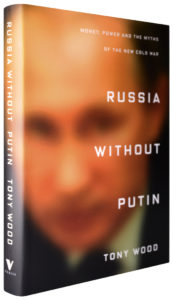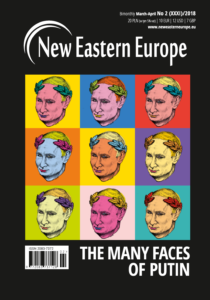 With economic conditions deteriorating and social turmoil escalating in various regions of Russia, President Vladimir Putin’s self-proclaimed “power vertical” is looking increasingly like a “power vertigo,” CEPA’s Janusz Bugajski observes:
With economic conditions deteriorating and social turmoil escalating in various regions of Russia, President Vladimir Putin’s self-proclaimed “power vertical” is looking increasingly like a “power vertigo,” CEPA’s Janusz Bugajski observes:
Since the collapse of the Soviet Union, all Russian governments have failed to modernize the state, whether through a European model of a democratic market economy or a Chinese model of state-directed capitalism. Instead, Russia has become a secret police oligarchy (or “Chekistocracy”) in which political freedoms are extinguished and the chasm between a corrupt ruling stratum and the populace has become unbridgeable.
Rap has begun capturing the minds of young people in Russia just as those aged 24 and under are moving from being the group most supportive of Mr. Putin’s government to one that is increasingly critical of it, according to multiple polls, notes Ivan Nechepurenko. The Kremlin seems to be worried, he writes for The NY Times:
 In December, Mr. Putin convened a meeting of the council that advises him on culture, and ordered his administration to develop a program that would increase the state’s role in pop music by introducing grants and by opening music studios around the country. The government said it would move to filter undesirable content on the internet, but so far has been unable to find an effective technical solution to do that.
In December, Mr. Putin convened a meeting of the council that advises him on culture, and ordered his administration to develop a program that would increase the state’s role in pop music by introducing grants and by opening music studios around the country. The government said it would move to filter undesirable content on the internet, but so far has been unable to find an effective technical solution to do that.
“The impact of hip-hop has been massive,” said the rapper Oxxxymiron, 34, a pioneer of independent hip-hop in Russia. He added that, “Through music, visual art, movies, dance, clothing styles and more, key values of hip-hop have spread through contemporary Russian culture.”
Russia is the biggest threat to a Georgia, according to a recent survey, conducted by the National Democratic Institute (NDI). The majority of Georgians named Russian military aggression (31 %), the occupation of Abkhazia and South Ossetia (11 %), Russian propaganda (10% and terrorism (4%), according to reports:
To the question, what Georgia can do to boost its national security, 28% of respondents said the NATO membership is a way out while 11% think the EU membership can help. 11% said the leader, who is an individual decision maker can increase national security while 6% of respondents consider that the country needs to strengthen its democracy. ….Moreover, 39 % of respondents estimate the collapse of the Soviet Union as a “bad event”.







